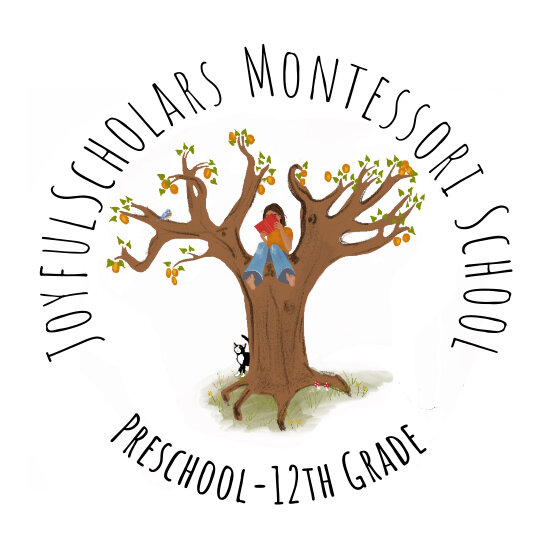
Upper Elementary
“Within the child lies the fate of the future.” -Dr. Maria Montessori
The Upper Elementary class consists of students ages 9-12 years old, which typically translates to grades 4th-6th.
Building on skills honed during Lower Elementary, students further their explorations in all subject areas, working on projects, group exercises, and individual studies. During the three-year cycle, students are exposed to a rich curriculum comprised of the following subject areas. Not all subjects are taught every year. Instead, students enjoy a cyclical program with each year highlighting various science and social studies focus areas, while doing Language Arts and Mathematics throughout.
Montessori Environment
In a Montessori Elementary classroom, students work individually or in small groups, at tables or on mats on the floor.
Natural lighting, soft colors, and uncluttered spaces set the stage for activity that is focused and calm. Learning materials are arranged on accessible shelves according to curricular area, fostering independence as students go about their work. Everything is where it is supposed to be, conveying a sense of harmony and order that both comforts and inspires.
The classroom is a happy community. Students are focused. They take joy in their work. They invent, explore, experiment, confer, create, prepare snacks, and curl up with books; sometimes they might even reflect in a peaceful, meditative corner. Meanwhile, teachers circulate throughout the room, observing the students and making notes about their progress, ever ready to offer support or introduce new material, as appropriate.
Older children are seen as role models within the community. They support the growth and development of younger children through socialization, assisting with new work, or teaching skills they have mastered themselves. They can also work with younger students in areas of the curriculum in which they themselves may need more practice, without stigma.
Younger children follow the example set by the older students, and have peers to work with in areas of the curriculum in which they may be more advanced. This multi-age community provides opportunities for all individuals to learn from each other, at times leading, sharing, or serving as role models. It also develops an appreciation of differences.
Curriculum
Math: The ideas of number concepts, place value, numerals, and related quantities are reinforced and expanded upon within the Elementary program.
Language: Reading and writing are integral to all subjects in Montessori Elementary, as children express their interests and satisfy their curiosity. Students master conventions with thorough studies of grammar, spelling, and mechanics. They produce final copies with careful penmanship and keyboarding. They read, analyze, think critically, and compare and contrast literature to support personal opinion and perspective. Using these reading and writing skills, they present ideas through formal and informal presentations.
Cultural Studies: Cultural studies are interdisciplinary and integrate zoology, botany, anthropology, geography, geology, physical and life sciences, and anthropology. Through these lessons, children explore the interconnectedness of all living things. Additionally, in-depth studies of history, physical and political world geography, civics, economics, peace and justice, the arts, world language, and physical education are introduced.
Science & Social Studies: Interdisciplinary and integrated studies of geology, geography, physical and life sciences, anthropology, and history are built around “Great Lessons,” a series of dramatic stories that explore the origins of the universe, our planet, and the continuous development of human advancement. The laws of physics and chemistry reveal the interdependency of all living things. Beginning with a study of civilization, students explore the contributions of history and what it means to be a responsible citizen and to seek ways to make the world a better, more peaceful place.
Wellness Program
One of the most beloved parts of our program is our wellness program. The children participate in winter sports like snowshoeing and skiing, as well as warm weather activities like hiking, biking and running. We also incorporate yoga and mindfulness in to our daily routine. The goal of PE is not just to get the wiggles out, but to connect children to activities they can enjoy as part of a healthy lifestyle.



